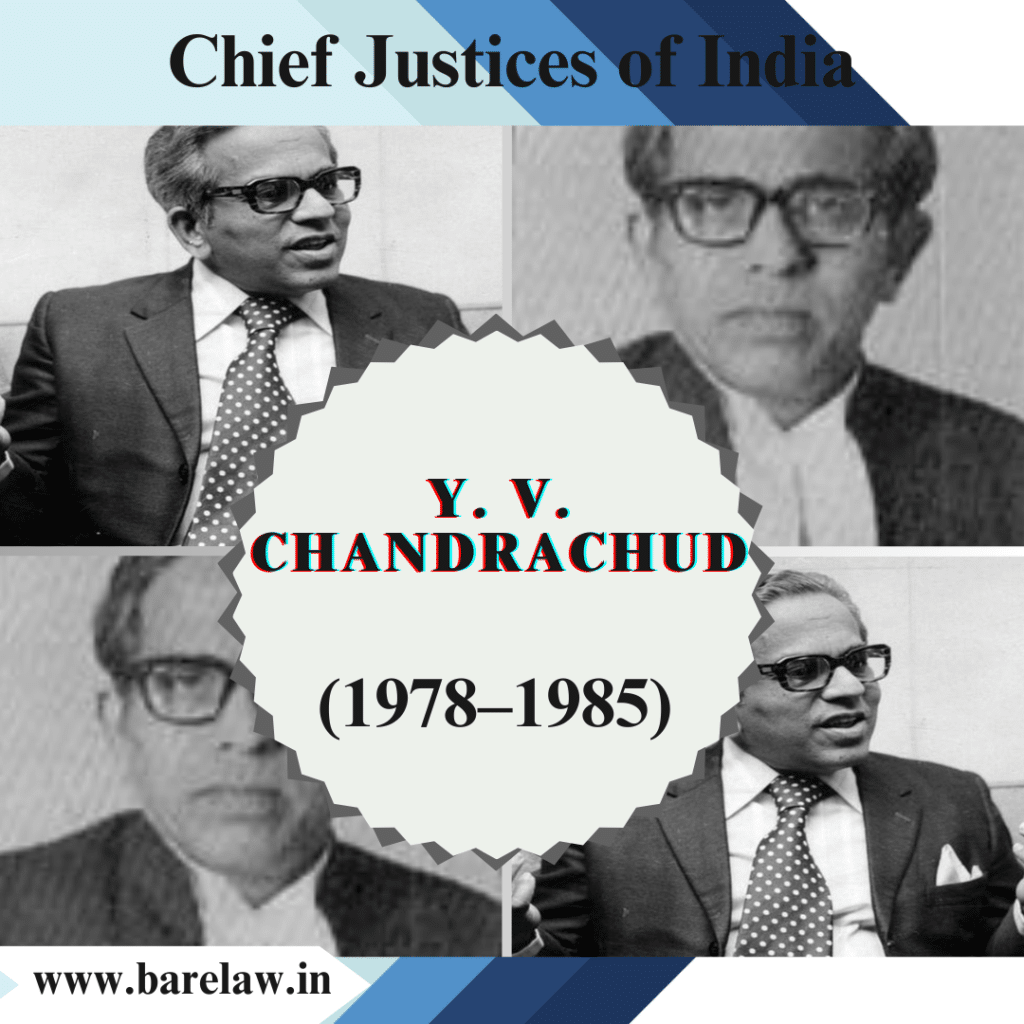
Table of Contents
Y. V. Chandrachud: The Legacy of India’s Chief Justice
Y. V. Chandrachud: The Legacy of India’s Chief Justice
The tenure of Yeshwant Vishnu Chandrachud as the Chief Justice of India from 1978 to 1985 marked a significant period in the country’s legal history. Serving as the 16th Chief Justice, Chandrachud’s judicial journey was characterized by landmark cases, bold decisions, and a profound impact on the Indian judiciary. In this article, we will explore the life and legacy of Y. V. Chandrachud, his notable contributions to Indian jurisprudence, and his enduring influence on the nation’s legal landscape.
Early Life and Legal Career
Y. V. Chandrachud was born on July 12, 1920, in Pune, India. He came from a family with a strong legal background, as his father, Vyankatrao Chandrachud, was a renowned advocate. This early exposure to the legal profession likely played a significant role in shaping Chandrachud’s career path.
He pursued his legal education at the ILS Law College in Pune and later completed his Master’s degree in law from the Government Law College, Mumbai. Chandrachud’s legal acumen and dedication to his profession quickly became evident, and he started building a reputation as a proficient lawyer.
His judicial career began in 1952 when he was appointed as a judge of the Bombay High Court. Over the years, he distinguished himself with his intellect, deep knowledge of the law, and a commitment to justice. These qualities eventually paved the way for his elevation to the highest judicial office in the country.
Landmark Cases and Legal Legacy
During his tenure as Chief Justice of India, Y. V. Chandrachud presided over several landmark cases that left an indelible mark on Indian jurisprudence. Some of the notable cases and judgments associated with his tenure include:
- ADM Jabalpur v. Shiv Kant Shukla (1976): This case is infamous for its controversial judgment during the Emergency era. Chandrachud was one of the dissenting judges who opposed the majority opinion, which upheld the suspension of fundamental rights during the Emergency. His dissenting opinion is celebrated for its defense of civil liberties and individual freedoms.
- Maneka Gandhi v. Union of India (1978): In this iconic case, the Supreme Court, under Chandrachud’s leadership, expanded the scope of Article 21 of the Indian Constitution to include the right to travel abroad. This judgment marked a significant departure from the narrow interpretation of fundamental rights.
- Minerva Mills Ltd. v. Union of India (1980): Chandrachud played a pivotal role in this case by asserting the doctrine of basic structure. The judgment held that Parliament could amend the Constitution, but it couldn’t alter its basic structure, thereby safeguarding the core principles of the Constitution.
- Habeas Corpus Case (1976): During the Emergency, Chandrachud’s strong stand on habeas corpus petitions was crucial in ensuring that individuals detained unlawfully were granted relief. His commitment to the rule of law and justice during this period is widely acknowledged.
- Ayodhya Land Dispute: Chandrachud was involved in several stages of the Ayodhya land dispute case. His efforts to maintain communal harmony while addressing this contentious issue were appreciated by many.
These landmark cases and judgments underscored Chandrachud’s commitment to upholding constitutional values, protecting individual rights, and ensuring justice even in challenging circumstances.
Judicial Reforms and Administrative Initiatives
As Chief Justice, Y. V. Chandrachud not only contributed to substantive legal developments but also played a crucial role in initiating judicial reforms and improving the administrative efficiency of the judiciary. Some of his significant contributions in this regard include:
- Case Management: Chandrachud introduced case management techniques to streamline court proceedings and reduce delays in the disposal of cases. This initiative aimed to ensure that justice was delivered promptly.
- Judicial Accountability: He advocated for transparency and accountability within the judiciary, emphasizing the importance of maintaining public trust in the judicial system.
- Judicial Education: Chandrachud stressed the need for continuous judicial education and training to keep judges updated with evolving legal principles and societal changes.
- Strengthening the Legal Aid System: Recognizing the importance of access to justice for all, he worked on improving the legal aid system in India, ensuring that the marginalized and underprivileged had access to legal representation.
Challenges and Criticisms
Like any prominent public figure, Y. V. Chandrachud faced his share of challenges and criticisms during his tenure as Chief Justice. Some of the criticisms included:
- Emergency Period: His participation in the Habeas Corpus Case and the dissent in ADM Jabalpur v. Shiv Kant Shukla attracted both praise and criticism, with some questioning the timing and nature of these decisions.
- Ayodhya Dispute: The Ayodhya land dispute case, while managed diplomatically, also faced criticism from various quarters, reflecting the inherent complexity of the issue.
- Political Interference: Like many Chief Justices, Chandrachud faced pressure and attempts at political interference in judicial matters, but he is remembered for his steadfast commitment to judicial independence.
Legacy and Enduring Influence
Y. V. Chandrachud’s legacy endures through his legal decisions, contributions to judicial reforms, and his unwavering commitment to justice and the rule of law. His judgments continue to be cited and revered by legal scholars, and his advocacy for fundamental rights and individual liberties remains relevant in contemporary legal debates.
His emphasis on judicial accountability, access to justice, and the protection of constitutional values serves as a guiding light for the Indian judiciary. Chandrachud’s ability to navigate complex legal and political terrain while upholding the principles of justice and the Constitution makes him an iconic figure in the history of the Indian judiciary.
In conclusion, Y. V. Chandrachud’s tenure as the Chief Justice of India was marked by a profound commitment to justice, constitutional values, and judicial reforms. His legacy continues to inspire generations of legal practitioners and serves as a testament to the pivotal role of the judiciary in upholding the rule of law in a democratic society.





